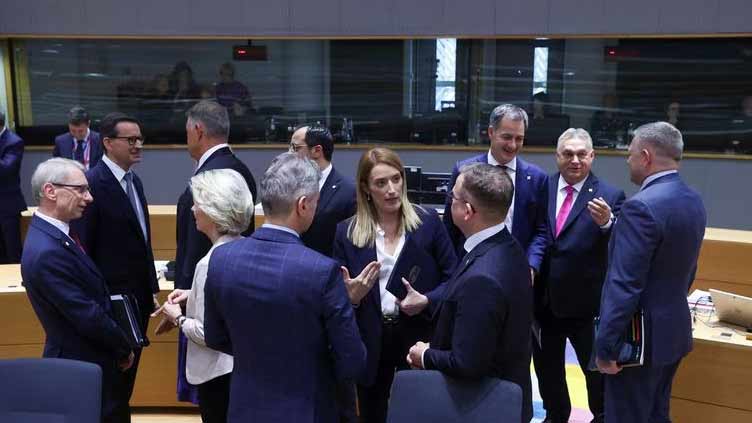EU leaders urge pauses in Gaza bombing to get aid in

World
They called for 'continued, rapid, safe and unhindered humanitarian access'
BRUSSELS (Reuters) - EU leaders called on Thursday for pauses in Israeli bombing and Hamas rocket attacks to get humanitarian aid into Gaza after days of wrangling that highlighted divisions within the bloc over the broader Israel-Palestinian conflict.
In a declaration agreed at a summit in Brussels, the leaders of the Union's 27 nations expressed the "gravest concern for the deteriorating humanitarian situation in Gaza".
They called for "continued, rapid, safe and unhindered humanitarian access and aid to reach those in need through all necessary measures including humanitarian corridors and pauses for humanitarian needs".
The summit was the leaders' first in-person meeting since the deadly Oct. 7 assault on Israel by Palestinian militant group Hamas, which prompted Israel to bombard and blockade Hamas-run Gaza.
While EU leaders have strongly condemned Hamas' attack, they have struggled to stick to the same message beyond that, with some stressing Israel's right to self-defence and others emphasising concern about Palestinian civilians.
The leaders' differences were still clear as they arrived for the summit.
"Israel is a democratic state guided by very humanitarian principles and so we can be certain that the Israeli army will respect the rules that arise from international law in everything it does," said German Chancellor Olaf Scholz. "I have no doubt about that."
Scholz's remarks contrasted sharply with comments in recent days by EU foreign policy chief Josep Borrell and Charles Michel, the chairman of EU leaders' summits, who have said that a total blockade of Gaza and attacks on civilian infrastructure already contravene international law.
Rights groups such as Human Rights Watch have also accused Israel of violating international humanitarian law.
Israel insists it is acting within international law and that its attacks are intended to destroy Hamas, which operates among the civilian population.
Belgian Prime Minister Alexander De Croo warned Israel against starving Gaza.
"Israel has a right to take action and to prevent future attacks. But that is never an excuse for blocking a whole region, for blocking humanitarian aid. It cannot be an excuse to starve a population," he said.
PAUSE VERSUS PAUSES
Ahead of the summit, diplomats spent days debating whether to call for a "humanitarian pause" or "pauses".
Countries such as France, the Netherlands, Spain, Portugal, Belgium and Ireland had endorsed calls from the United Nations for a break in the conflict for humanitarian reasons.
But others such as Germany, the Czech Republic and Austria resisted, arguing such a measure could curb Israel's ability to defend itself and let Hamas regroup, according to diplomats.
The compromise on "pauses" in the plural was meant to signal short breaks in fighting for missions such as hostage releases or aid convoys, rather than a formal ceasefire, diplomats said.
While the EU's influence on the conflict is modest, the bloc fears that an escalation could have grave consequences for Europe, including a rise in tensions between communities, possible Islamist militant attacks and a flow of refugees.
The crisis erupted with the EU already grappling with the fallout from another war in its immediate neigbourhood - the conflict triggered by Russia's invasion of Ukraine.
Ukrainian President Volodymyr Zelenskiy addressed the summit by video link as the EU leaders pledged they will continue to support Ukraine even amidst another major crisis.
"We must clearly see this scenario of a larger fire in the Middle East and counter it together," Zelenskiy said.
"The sooner security prevails in the Middle East, the sooner we will restore security here in Europe."
Some officials and diplomats have voiced fears that Ukraine may now struggle to get the same political attention and resources from the West, particularly the United States, due to the new crisis in the Middle East.


